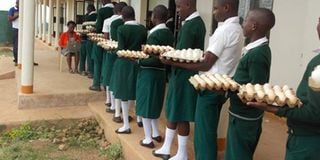Rearing chicken and collecting eggs helps pay their school fees

Lining up to have the eggs registered by the school bursar. Photo by Michael J Ssali
Students of the recently opened Suubi Secondary and Vocational College in Lubanda village, Kisekka Sub-county, Lwengo District, contribute to the payment of their own school fees by rearing Kuroiler chicken in their homes.
“It is an idea that was introduced by the school director, David Ssemwogerere,” says 14-year-old Vincent Luwaga, who is in Form One. “We keep five Kuroiler hens and we bring an average of five eggs daily to the school administration as payment for school fees.”
The school, which opened this year, has 42 students in Form One. Luwaga revealed that the hens were given to the students as a loan, which they are expected to pay back.
He narrates: “The school administration visited our homes and involved our parents in the idea. An expert in poultry keeping came to the school and taught us the basic skills of looking after the chicken.
Looking after the hens
They graze freely around the home like local chicken. We were told to supplement their feeding with maize bran and layers’ marsh. When such feeds are placed in a container such as a plastic tray in the compound they eat them and at the same time scavenge for the rest by scratching the ground.
We were also told that it is important to place water in a specific place in the compound where they can drink it. Then each one of us was given five Kuroiler hens. They were quite mature and within month, they began to lay eggs.”
The school buys the eggs at Shs250 each, and the five hens are valued at Shs50,000, which is the loan granted. But each student has to pay back a total of Shs60,000.
The school director Ssemwogerere explained that the extra Shs10,000 that is paid as interest on the loan is to be used next year to acquire more hens for the new students at the school.
He explains: “The loan is payable within one year,” he explained. “We intend to get an incubator so that we can produce the chicks at the school. We want the students to know that they don’t have to get free things. It’s a chance for them to learn about loans and servicing them.
On the last Friday of every month, we hold experience sharing meetings. The students, the parents, and poultry experts attend the meeting in which the participants share stories of what worked and what did not work.
Some of the parents and the children have some traditional knowledge with regard to chicken illnesses and their treatment and we listen to their stories.”
Shanita Namaganda, school bursar and project officer, adds: “Poultry keeping makes it easier for them to meet their scholastic needs. The local community where the students come mainly depends on income from crop production but such income is seasonal and subject to weather changes. Kuroiler hens will normally scratch the ground for insects and as long as they have water to drink they will keep laying the eggs.”
Make it easier
She disclosed that the fees per term is Shs140,000 and that the income from eggs is only intended to make it easier for the parents to pay the students’ tuition fees.
“Only a few students are orphans. The parents are expected to pay fees anyway and what the students earn should supplement the parents’ effort. Some of the income from the eggs may be used to buy such items as shoes or school uniform, or some books.”
Jacinta Nakasiige was surprised that Kuroiler hens lay eggs every day for many months. “I am planning to purchase more hens next time,” she said.




